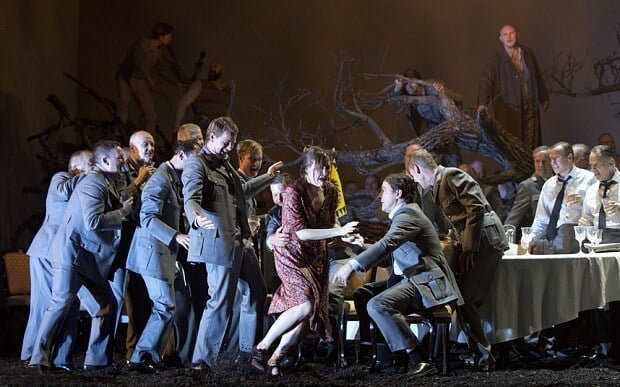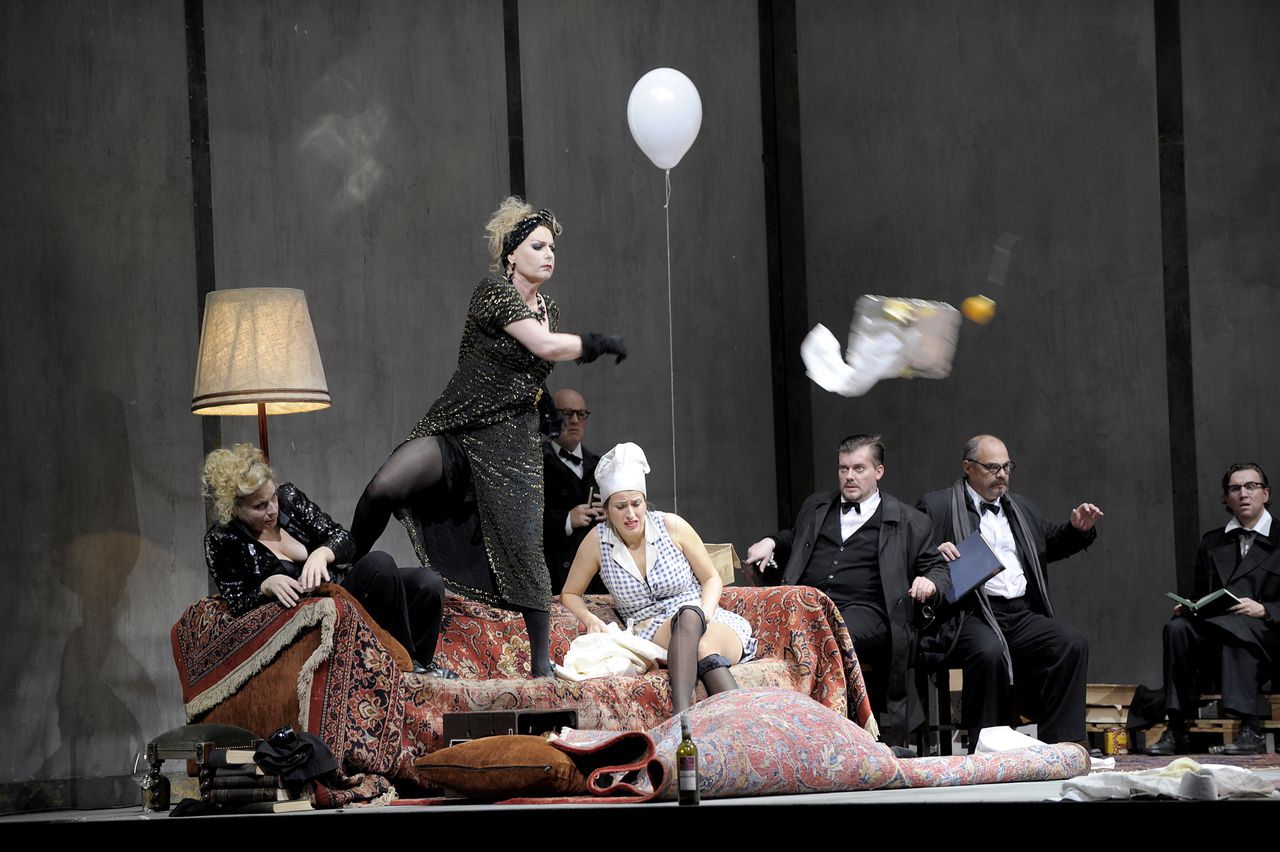In her delightful article ” The Abduction of Opera ” Heather Mac Donald describes how director’s theater embodies the belief that a director’s interpretation of an opera is just as important as what the composer had in mind. If not more important. By some inexplicable coincidence, many “progressive” directors have discovered an inexhaustible supply of sex, violence and outdated, corny political criticism in operas from the early Baroque to the late Romantic period.
For your information
This text contains sexist, Islamophobic and unwelcome images and passages. These may be considered offensive.
You can have any review automatically translated. Just click on the Translate button,
which you can find in the Google bar above this article
On August 10, 1566, a Protestant sermon in the village of Steenvoorde in the Netherlands caught fire. The hatred of (the Catholicism of) the Spanish occupier manifested itself in the storming of a Roman Catholic monastery, the destruction of religious statues , the destruction of books and the looting of church silver. The iconoclasm (“Beeldenstorm“) had begun: in six weeks, Roman Catholic churches were severely damaged and their interiors destroyed. This barbaric escalation, an expression of impotent rage, played an important role in the outbreak of the Eighty Years’ War between Spain and the Netherlands and the birth of the Dutch Republic of the Seven United Provinces. To the best of our knowledge, the Archbishop of Utrecht, Cardinal Eijk, has not yet asked for an apology from Protestant Holland. That the people, but not the people alone, react unreasonably and barbarically to unwelcome matters in the broadest sense of the word is unfortunately a constant in world history. In this case, valuable art treasures were the first victims.
In 2001, the Taliban in Afghanistan began demolishing all statues in the country, including large Buddha statues. (This barbarity resumed in 2021.) “All statues will be destroyed,” said the then Afghan Minister of Culture and Information. This destruction of cultural heritage was defended on the grounds that the statues were a severe affront to Islamic ideology. Making peace with Allah has questionable ramifications….
Entführung aus dem Serial, not suitable for younger viewers.
A similar destruction of cultural heritage – or, more broadly, vandalism- is occurring in our time in the operatic world, inspired by a vague modernism coupled with psychological groupthink and underpinned by shocking ignorance and a fierce desire to be part of an imaginary cultural elite. If, for the sake of convenience, we stick to 19th-century operas, we can hopefully agree that the creative source of the work springs from a creative librettist and a creative composer (even if these are one and the same person). Regietheater, which has been proliferating for some 50 years now, though fortunately in diminishing numbers, is very similar to the Protestant and Islamic Iconoclasts. Even in the decapitation of the librettist, often presented as “innovation” but in reality an ideology leaning toward fanaticism, an artistic product, the libretto, is thrown out with the sewage.
The misguided followers of Regietheater are essentially no different from the aforementioned Protestant and Islamic iconoclasts, the difference being that the latter were merely bent on destruction, while the adepts of Bieito e tutti quanti want “something” in its place for the demolition. Something innovative! Something urgent! Something contemporary! Something unsettling!

Les Indes Galantes at Naturist Camp The Black Hole
However, renewal is a gratifying activity if it involves the bathroom; for something urgent one should call the doctor or the fire department, and if one wants to experience something unsettling, I recommend a movie with Scarlett Johansson, and for something contemporary, I recommend a reliable village announcer. Paul Cézanne’s painting Le Garçon au gilet rouge does not need renewal any more than Rossini’s opera Guillaume Tell does. Just because the opera is “living musical theater” does not mean that its authenticity should not be respected and that the episodic work of art can be deported without objection to the torture chamber of the opera adaptation factory.
So dissecting an opera is at best a trivial but often rather malicious activity, for libretto and score form an inseparable duality. The arguments for this duality usually fall on deaf ears. In the “Spinnerlied” from Wagner’s Fliegende Holländer, for example, you can hear the spinning wheels in the orchestra; when the spinning wheel on stage is replaced by an exercise bike, the scene is idiotically negated, or rather, raped. That many of Today’s People have no problem with this is extremely questionable. Although, they often don’t know any better….
And with “operas in a dusted-off production” (the abject terminology alone!) there is not only a discrepancy between the music and the stage image, but also between the text and the stage image of the “updated” performance.

“Renewal,” that’s another one of those meaningless – and, above all, unjustified – cries of the unthinking. Renewal in opera consists either of applying new stage techniques that can bring an existing opera, including libretto, even more beautifully to the stage, or, of course, a new opera. With a new score and a new libretto. And in the field of newly written operas, there is plenty to enjoy.
The idea that a 19th-century opera needs to be “updated” undermines the integrity of the work of art. Is renewal a line of 14 men on the toilet with their pants down to their ankles? Don Giovanni as a junkie and a blood-soaked Entführung aus dem Serail, in which one singer empties his bladder on another? Is that innovation? A Freischütz in which the tenor has to hop around naked for the entire performance, is that innovation?
PURPOSELESS ROAD
Opera is an episodic art form; bringing it into the present is an unholy path, unfortunately with too little understood and too often deliberately concealed disastrous consequences.
In our opinion, we should look in a completely different direction. Look back on a historical, authentic work of art. Be glad it is there, be glad that we can still experience it in its more or less original form.
Enjoy this in 2023, it could not be more contemporary.
Olivier Keegel


Schrijven kun je absoluut, beste Olivier, maar in feite is het altijd hetzelfde verhaal. Opera past niet in een nieuw jasje. Dat kan dus wel, als je goed kijkt en luistert. Toen ik het nog kon betalen tot 2014 ging ik zo ongeveer elke opera zien bij DNO, vooral Bellini, Donizetti, Verdi, Leoncavallo, Mascagni, Mercadante, Puccini (ik moest er even aan wennen). Richard Strauss, tja, twijfelgeval, ik vind de opera Der Rosenkavalier sowieso te lang, en helemaal niet zo komisch. De enige die ik helemaal kon volgen: Anna Tomowa Sintow (Marschallin), Agnes Baltsa (onverslaanbare mezzo), Janet Perry (Sophie). Dan ervaar… Read more »